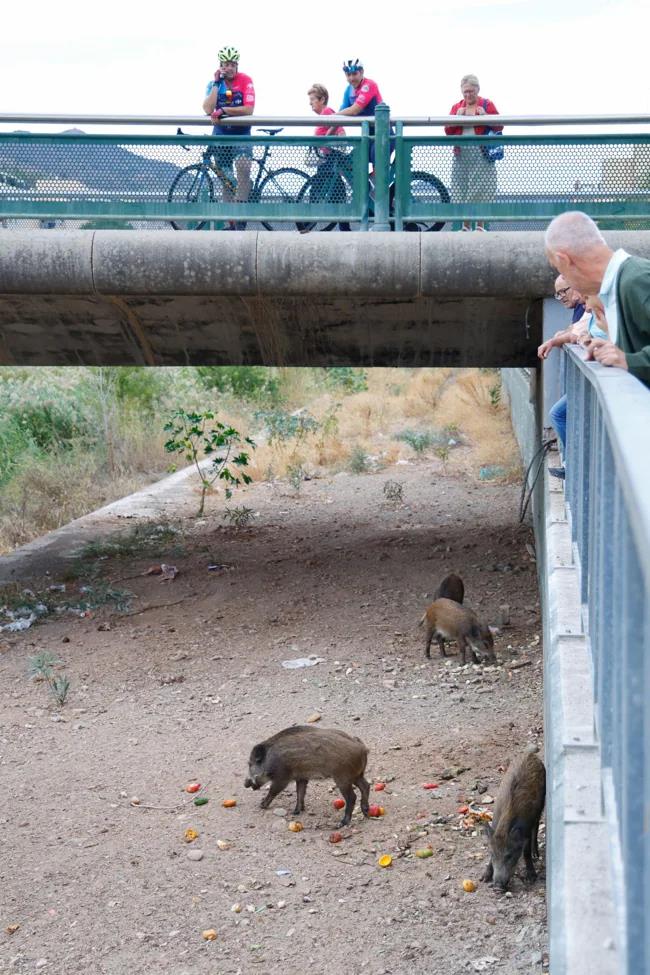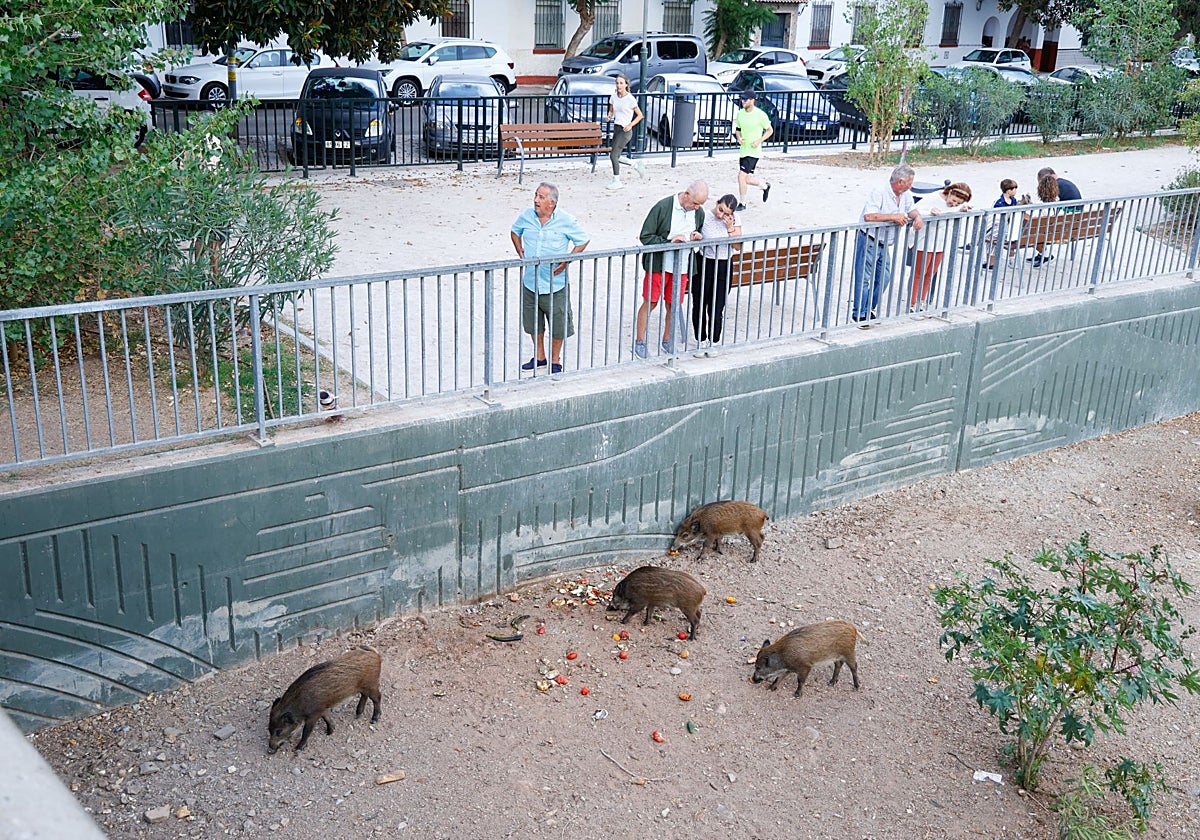Wild boar numbers up sevenfold in Malaga leading to serious environmental and health concerns
With an estimated population of 22,000 'jabali' in the province, crossbreeding with pigs increases the risk of diseases such as African swine fever. The hybrid specimens can have up to 12 offspring
In recent years, the presence of wild boar in urban areas of the Costa del Sol has increased exponentially. For Malaga the increase is sevenfold. Worryingly, they are also becoming more and more accustomed to city life. Complaints from the locals, farmers, golf courses, drivers fearing an accident and more. Both local councils and the Junta de Andalucía are deploying all sorts of solutions to deal with this invasion. Here's the why and the how.
There are several, obvious scientific issues. The first is that most of them are not wild boars but rather feral pigs, crossbreeds from farm-reared or free-range pigs - so-called 'cerdalíes'. The second is that they are an invasive species and should therefore be treated as a pest, despite criticism from the animal rights sector. The third is that there is also exponential growth, although there are no given maximums to be permitted. The fourth issue is the possible spread of diseases and infections that could clearly harm the pig population.
Hunting them is one emergency measure that has been active in Andalucía for the last ten years. These hybrid populations have grown so much that they pose a clear environmental and health threat, as well as a threat to the pig trade and personal security.
Félix Gómez-Guillamón, head of the service managing such problems for the Junta's provincial department for the environment in Malaga, reflects on all these issues in an interview with our sister newspaper SUR: "There are species that are easier to count up, such as the rabbit, the partridge or even the mountain goat... They provide very accurate population counts. With wild boar, because of their nocturnal habits and their movements, it is very complicated, as it is with roe deer too. Conducting a census of each species in the wild is a different world." In various gatherings and meetings on the subject it was set as a marker that, for every specimen hunted, three would remain free. According to official data from the Junta de Andalucía, for the 2007-2008 season some 1,273 individual pigs were hunted and killed in Malaga province. By the 2022-23 season it was already up to 7,490. That is an increase of 488% in 15 years as these animals have no natural predator. This suggests that the wild boar population has increased from 7,490 to 22,470 as of last year. Across Spain the population would probably be around 1.5 million since the last hauls from hunting totalled 500,000.

Zoom

With all due caution, the figures reveal without a doubt what has already become a serious problem, especially in the provinces of Malaga and Cadiz, where there is the highest incidence of wild boars in urban areas and where there is the most cross-breeding, according to Gómez-Guillamón, who is also a veterinarian.
Up to 12 offspring
What happens when they crossbreed? Well, their reproductive capacity skyrockets. "A pure boar sow can have between three and five boarlets (or piglets), while a domestic sow [crossed with a wild boar] can have up to a dozen offspring," says this vet.
Among the factors contributing to the exponential increase in the number of wild boar, he mentions the decline in the number of hunters and the obvious lack of generational replacement as less of the youth now hunt. Every hunting season there is a call to respond to this emergency.
Streams provide easy access
In almost all hunting grounds, even if they are smallholdings, wild boar can be hunted. The hunting season runs from October to February and has been extended when it is to eradicate crossbreeds. Hunting is just one of the actions that can be taken to control the invading population of feral pigs, but it cannot be used to eradicate an invasive species, a pest. That is quite a different matter.
According to this environmental scientist, riverbeds and streams are the main corridors through which these animals enter towns and cities. In Malaga city the presence of these porcine beasts in Ciudad Jardín, Cerrado, Limonar, Hacienda Paredes and Parque Clavero is very evident. During the day they doze in the riverbeds and at night they usually go a-wandering. It is true that lately their forays have switched fully to daytime mode. Locals are no longer taken aback by their presence but they are fearful of the damage the cerdalíes can cause, the risk of attacks on the public and even causing traffic accidents.
Stuck in the riverbeds
"They get stuck in waterways and then head down to areas with water, litter, rubbish dumps... It makes no sense not to try to eradicate them. There is a great health and epidemiological risk. We are talking about diseases such as tuberculosis. And these are infections that are transmitted to domestic livestock. We are very concerned about African swine fever. It has not yet appeared but the damage to the industry would be enormous, with all movements blocked," says this environmentalist. "There is no element of favourable analysis. There is no way of dealing with it. They are also going after young partridges, rabbits, hares and even young roe deer... They are doing a lot of damage everywhere," he says, acknowledging that the drought has also made things worse.
An unwanted public attraction on the Guadalmedina
Even the cat colonies and the food they accumulate are a focal point, attracting the wild boar to scavenge. Incidentally, Gómez-Guillamón also believes that feral cats are damaging the urban environment, but that is another matter. In any case there is a clear message: do not feed the wild boars, something that, in some parts of the city like the Guadalmedina riverbed, has become an unwanted public attraction.
The next population control measure is to use archers. A group (SCAES) has been formed through the Andalusian hunting federation (FAC). They keep themselves to themselves but Gómez-Guillamón gives special mention as to their experience. They stay in the trees at night and, in urban areas, they shoot from high up down to the ground to avoid additional risks to anyone or anything else nearby. They are seen as a great help to the Junta's work to reduce the wild boar population.
First actions in Malaga city
Malaga city council has resorted to a similar method, although it is a private company contracted via public tender. In the urban environment, preliminary work has begun to detect and identify these animals' movements. The SCAES-FAC group has been awarded the contract for just over 13,000 euros, shooting over a period of five months.
Another way of tackling the issue is the use of traps in certain locations. The Junta has a contract in the publicly-managed forests with Tragsatec, a publicly-run company. "We use traps in various areas: Cortes de la Frontera, Sierra de las Nieves, Marbella... We have had many problems with animal rights activists sabotaging the traps."
On other possible measures, the vet explains that there are trials with contraceptives to prevent these feral pigs from reproducing, but they are not effective given the scale of the issue. "It is an alien and invasive species. It has no place in the natural environment. There is a problem of education."
The environmental management service led by Gómez-Guillamón offers support to town councils and companies that want to take action over this problem. In urban areas firearms are not used but, for example, the captive bolt stunning gun is used. This is a stun gun that instantly kills the animal and has been used in areas such as La Zagaleta in Benahavís.


